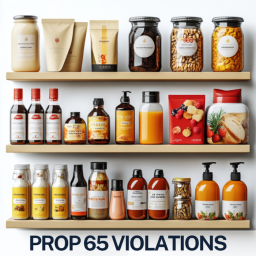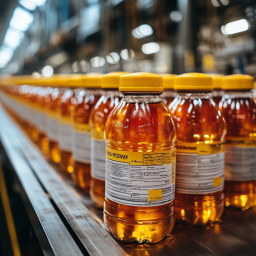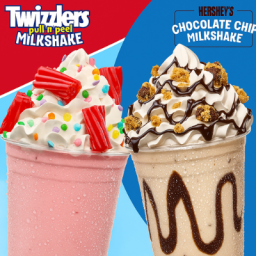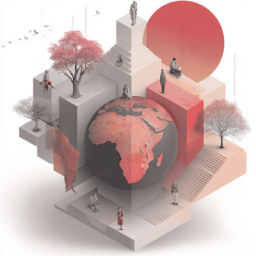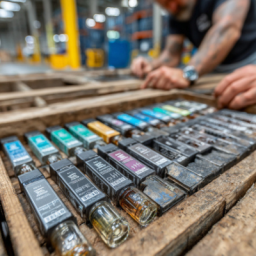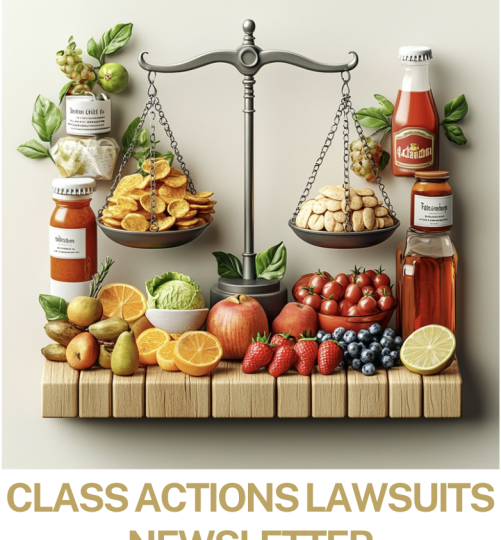
The following is a summary of relevant, notable Class Action Lawsuits that were filed during September 2025. Below is a summary of the plaintiff’s allegations. To request a copy of a particular complaint or for queries or further discussion, you’re welcome to reach out via email at [email protected].
What Is a Class Action?
A class action is a lawsuit filed on behalf of a group of people (a “class”) who have suffered similar harm from the same defendant. Instead of many individuals filing separate cases, one or more plaintiffs act as class representatives. This allows courts to address widespread harm more efficiently and ensures consistent results. In consumer protection cases—like the food and beverage filings we’ve reviewed—class actions often target misleading labels, false advertising, or deceptive marketing practices.
1.Argueta v. Unilever United States, Inc. d/b/a Liquid I.V.
Plaintiff: Jessica Argueta
Defendant: Unilever United States, Inc. d/b/a Liquid I.V.
Product Focus: Liquid I.V. Lemon Lime Electrolyte Drink Mix
Summary:
Plaintiff alleges that Unilever deceptively packages its Liquid I.V. Lemon Lime Electrolyte Drink Mix in oversized opaque stick packs that are more than half empty. The complaint contends that the product’s “slack-fill”—nonfunctional empty space—misleads consumers into believing they are purchasing a greater quantity of drink mix than is actually provided. Plaintiff argues that the packaging lacks indicators like fill lines or transparent windows, preventing consumers from understanding the true amount inside before purchase.
The lawsuit further claims that the underfilled packaging violates federal slack-fill regulations (21 C.F.R. § 100.100) and California’s Unfair Competition Law, False Advertising Law, and Consumers Legal Remedies Act. Plaintiff asserts that the misleading packaging caused her and other consumers to pay a premium price for less product than represented, while competitors who accurately disclose contents are placed at a disadvantage.
Prayer for Relief:
Plaintiff seeks certification of the class, appointment as class representative, and designation of counsel as class counsel. She requests injunctive relief to stop the challenged packaging practices, along with damages, restitution or disgorgement, attorneys’ fees, and costs.
2. Charalampopoulou v. Mush Foods, Inc.
Plaintiff: Dimitra Charalampopoulou
Defendant: Mush Foods, Inc.
Product Focus: Mush Protein Overnight Oats (peanut butter, peanut butter chocolate chip, and PB&J flavors) labeled “15g Protein”
Summary:
Plaintiff alleges that Mush Foods misleads consumers by prominently advertising “15g Protein” on the front of its Protein Overnight Oats without disclosing the corrected daily value (%DV) of protein on the Nutrition Facts Panel as required by FDA regulations. The complaint explains that because the protein comes from plant-based sources such as oats and peanuts, it is less digestible than animal-based protein. As a result, the product provides less usable protein than consumers are led to believe from the grams stated on the front label.
The lawsuit claims that this omission violates federal and California law, including the Sherman Food, Drug & Cosmetic Law, the False Advertising Law, the Unfair Competition Law, and the Consumers Legal Remedies Act. Plaintiff asserts that consumers paid a premium for the oats believing they were receiving the full protein amount, when in fact the corrected amount of usable protein is significantly lower.
Prayer for Relief:
Plaintiff seeks certification of the class, injunctive relief to stop the misleading protein claims, restitution, damages, disgorgement of profits, attorneys’ fees, costs, and any further relief deemed proper by the court.
3. Deanda v. New Era Real Estate Solutions LLC
Plaintiff: Leticia DeAnda
Defendant: New Era Real Estate Solutions LLC
Product Focus: Nutrivein Premium Berberine+ with Ceylon Cinnamon dietary supplement
Summary:
Plaintiff alleges that New Era Real Estate Solutions falsely and deceptively markets its Nutrivein Premium Berberine+ supplement as containing 1200 milligrams of berberine per serving. Independent laboratory testing and plaintiff’s own analyses showed that the product contains significantly less berberine, in some cases as low as 23.6 to 55.28 mg per serving. Plaintiff contends that this large discrepancy renders the supplement misbranded under federal regulations, which require dietary supplements to contain 100% of the declared active ingredient.
According to the complaint, consumers reasonably relied on the “1200 MG PER SERVING” claim when purchasing the supplement, paying a premium price based on the false representation. Plaintiff asserts that had she and other class members known the product did not contain the labeled amount, they would not have purchased it or would have paid substantially less. The lawsuit seeks relief under multiple state consumer protection statutes, as well as claims for unjust enrichment and breach of warranty.
Prayer for Relief:
Plaintiff seeks certification of the class, damages, restitution, disgorgement of profits, injunctive relief to stop the deceptive labeling, attorneys’ fees, costs, and any further relief deemed appropriate by the Court.
4. Haschemie v. Cinco Spirits Group, LLC
Plaintiff: Nabil Haschemie
Defendant: Cinco Spirits Group, LLC
Product Focus: Cincoro Tequilas (Blanco, Reposado, Añejo, Gold, Extra Añejo, Añejo Cristalino, and AC Milan) marketed as “100% de Agave”
Summary:
Plaintiff alleges that Cinco Spirits Group falsely markets its Cincoro tequila line as “100% de Agave” when independent laboratory testing revealed the products contain ethanol derived from sources other than Blue Weber agave, such as sugarcane or corn. Plaintiff claims that this adulteration violates both Mexican and U.S. regulations governing tequila, which strictly require that spirits labeled “100% agave” be made exclusively from the sugars of Blue Weber agave grown in designated regions of Mexico.
The lawsuit asserts that consumers paid premium prices—ranging from $89.99 to over $1,700 per bottle—for what they believed to be authentic, premium tequila, only to receive products enhanced with cheaper alcohol. Plaintiff contends that Cinco’s representations misled consumers, deprived them of the benefit of their bargain, and unfairly placed compliant competitors at a disadvantage.
Prayer for Relief:
Plaintiff seeks certification of nationwide and Florida classes, damages, restitution, disgorgement of profits, injunctive relief to prevent further mislabeling, attorneys’ fees, costs, and any other relief deemed just and proper by the Court.
5. Piotroski v. Dr Pepper/Seven Up, Inc.
Plaintiff: Karin Piotroski
Defendant: Dr Pepper/Seven Up, Inc.
Product Focus: Canada Dry beverages (including ginger ale, club soda, tonic water, and flavored seltzers)
Summary:
Plaintiff alleges that Dr Pepper/Seven Up misleads consumers by marketing its Canada Dry beverages as though they are produced in Canada, when in fact the products are manufactured in the United States. The complaint points to the brand name “Canada Dry,” along with packaging and advertising, as representations that mislead consumers into believing the beverages are authentically Canadian.
According to the lawsuit, this geographic misrepresentation leads consumers to pay a price premium for Canada Dry over comparable products such as Schweppes, based on the perception of authenticity. Plaintiff claims she and other consumers would not have purchased—or would have paid less for—the beverages had they known they were made in the U.S. The complaint alleges violations of New York General Business Law §§ 349 and 350, and asserts that Dr Pepper/Seven Up has profited unfairly from the deception.
Prayer for Relief:
Plaintiff seeks class certification, restitution, disgorgement, damages, attorneys’ fees, costs, and injunctive relief prohibiting the continued misrepresentation of Canada Dry beverages.
6. Williams et al. v. Global Product Management, Inc., National Product Exploration, Inc., and Dish Direct, Inc.
Plaintiffs: Michael Williams, Brian Stinson, and Justin Brewer
Defendants: Global Product Management, Inc., National Product Exploration, Inc., and Dish Direct, Inc.
Product Focus: Extenze male enhancement supplements
Summary:
Plaintiffs allege that Defendants deceptively marketed Extenze supplements with false promises of increased libido, improved sexual performance, and boosted testosterone levels. The complaint asserts that these products are marketed as if they were safe and effective drugs, despite lacking FDA approval. Packaging, websites, and advertisements allegedly positioned Extenze as comparable to prescription treatments, misleading consumers into believing the products could treat sexual dysfunction and hormonal issues.
The lawsuit further claims that Extenze products contain undisclosed amounts of yohimbe bark extract, an ingredient linked to serious side effects such as anxiety, hypertension, and even death in some cases. Plaintiffs argue that Defendants’ failure to disclose these risks, combined with unsubstantiated medical claims, rendered the products unsafe, misbranded, and illegal under federal and California law. Consumers allegedly paid a premium for supplements that were ineffective, dangerous, and not compliant with regulatory standards.
Prayer for Relief:
Plaintiffs seek class certification, damages, restitution, disgorgement of profits, injunctive relief halting deceptive marketing, corrective advertising, attorneys’ fees, costs, and other relief deemed appropriate by the Court.
7. Ramirez v. S. Martinelli & Company
Plaintiffs: Joly Ramirez and Sorangie Sanchez
Defendant: S. Martinelli & Company
Product Focus: Martinelli’s Apple Juice, Sparkling Cider, Sparkling Blush, and other juices
Summary:
Plaintiffs allege that Martinelli’s falsely markets its juices and sparkling beverages as “100% Juice” despite containing added ingredients such as ascorbic acid (Vitamin C) and “natural flavors.” The complaint claims that for years Martinelli’s promoted its products as containing “no additives of any kind,” but quietly removed that language while continuing to add preservatives and other non-juice ingredients. According to Plaintiffs, the front labels still emphasize “100% Juice,” misleading consumers into believing the products contain only juice with no additives.
The lawsuit contends that this labeling violates FDA rules requiring companies to disclose additives directly on the front label with qualifiers like “100% Juice with added preservative.” Plaintiffs assert that the omissions deceive reasonable consumers, especially given Martinelli’s premium reputation and higher price point. They argue that they and other class members paid more for the products than they would have if the presence of preservatives had been disclosed, causing economic injury. Causes of action include violations of California and New York consumer protection laws, the CLRA, and unjust enrichment.
Prayer for Relief:
Plaintiffs seek certification of nationwide and state subclasses, damages, restitution, disgorgement, injunctive relief to stop deceptive labeling, attorneys’ fees, costs, and any other relief the Court deems just and proper.
8. Legrier v. Ancient Organics
Plaintiff: Kendra Legrier
Defendant: Ancient Organics
Product Focus: Ancient Organics Ghee
Summary:
Plaintiff alleges that Ancient Organics deceptively markets its clarified butter (ghee) as a healthy fat alternative, despite each serving containing 8 grams of saturated fat, equivalent to 40% of the recommended daily value. The complaint argues that claims like “the very best fat one can eat,” “High MCFA’s,” and “Good Fat” mislead consumers into believing the product supports positive dietary practices, when public health authorities advise limiting saturated fat consumption.
According to the complaint, the product is “misbranded” under New York law because it highlights favorable fat-related claims without directing consumers to the actual saturated fat content, as required by regulations. Plaintiff asserts that she and other consumers paid a premium price of approximately $17.99 for the ghee based on misleading representations, when the product was worth less than advertised. Causes of action include violations of New York General Business Law §§ 349 and 350
Prayer for Relief:
Plaintiff seeks class certification, damages, restitution, and injunctive relief to stop misleading labeling, along with attorneys’ fees, costs, and any other relief deemed proper by the Court
9. Triesch v. Walmart Inc.
Plaintiff: Walter Triesch
Defendant: Walmart Inc.
Product Focus: Parent’s Choice Banana Yogurt Bites labeled “No Preservatives”
Summary:
Plaintiff alleges that Walmart misleads consumers by labeling its Parent’s Choice Banana Yogurt Bites as containing “No Preservatives,” while the ingredient list reveals the inclusion of ascorbic acid (Vitamin C). The complaint contends that ascorbic acid functions as a preservative by preventing oxidation, spoilage, and microbial growth, contradicting Walmart’s front-label claim.
According to the lawsuit, consumers reasonably rely on “No Preservatives” claims when purchasing food for themselves and their families, often paying a price premium for such assurances. Plaintiff argues that Walmart’s misbranding deceives consumers into believing the product is preservative-free, causing them to spend more than they otherwise would have. The action alleges violations of New York General Business Law §§ 349 and 350 and seeks redress for the alleged economic harm caused by false labeling
Prayer for Relief:
Plaintiff seeks class certification, damages, restitution, and injunctive relief to stop Walmart from marketing the product as preservative-free, along with attorneys’ fees and costs
10. Albertson v. The Vitamin Shoppe, LLC
Plaintiff: Tam Albertson
Defendants: The Vitamin Shoppe, LLC and Vitamin Shoppe Procurement Services LLC
Product Focus: Plnt Organic Protein Bar – Peanut Chocolate
Summary:
Plaintiff alleges that Vitamin Shoppe misleads consumers by understating the sodium content of its Plnt Organic Protein Bar. The nutrition label states the bar contains 140 mg of sodium, but independent laboratory testing commissioned by plaintiff’s counsel showed sodium levels ranging between 168 mg and 186 mg per serving—more than 20% higher than the labeled amount. Plaintiff argues that this discrepancy renders the bars misbranded under California law, making them not fit for sale.
The complaint further contends that Vitamin Shoppe’s representations about sodium content induced consumers to purchase the bars at a premium price of $3.29, believing them to be healthier than competing products. Plaintiff claims he and other consumers would not have purchased the bars, or would have paid less, if the true sodium content had been disclosed. Causes of action include violations of California’s Consumer Legal Remedies Act (CLRA), Unfair Competition Law (UCL), False Advertising Law (FAL), and breaches of express and implied warranty
Prayer for Relief:
Plaintiff seeks class certification, damages, restitution, disgorgement, corrective advertising, injunctive relief to stop mislabeling, and recovery of attorneys’ fees and costs
11. Donadio v. Florida Natural Growers, Inc.
Plaintiff: Patricia Donadio
Defendant: Florida Natural Growers, Inc.
Product Focus: Florida’s Natural Orange Juice
Summary:
Plaintiff alleges that Florida Natural Growers misleads consumers by prominently representing its orange juice as being made exclusively from Florida-grown oranges. Labels feature the claim “Owned by Florida Farmers” alongside patriotic imagery, reinforcing the impression of a purely domestic origin. According to the complaint, however, the juice is blended with imported orange juice from Mexico and Brazil, and not made solely from Florida oranges as advertised.
The lawsuit claims that these misrepresentations exploit consumer preference for Florida-grown citrus, which studies show is widely perceived as superior in taste and quality. Plaintiff argues that Florida Natural capitalized on this perception to charge a price premium, deceiving consumers who reasonably believed they were purchasing an all-Florida product. Causes of action include violations of state consumer protection statutes and common law misrepresentation
Prayer for Relief:
Plaintiff seeks class certification, restitution, damages, disgorgement, injunctive relief to prevent further misrepresentations, and recovery of attorneys’ fees and costs.
12. Morris v. Evig, LLC d/b/a Balance of Nature
Plaintiff: Vernita E. Morris
Defendant: Evig, LLC d/b/a Balance of Nature
Product Focus: Balance of Nature Fruits, Veggies, and Fiber & Spice supplements
Summary:
Plaintiff alleges that Balance of Nature engaged in deceptive trade practices by falsely advertising its supplements as high-quality, scientifically backed products that could prevent, treat, or cure serious health conditions, including diabetes, arthritis, heart disease, and cancer. The complaint references a 2019 FDA warning letter and a 2023 federal consent decree that temporarily shut down production until the company agreed to hire a labeling expert to ensure compliance.
According to Plaintiff, Balance of Nature misrepresented the quality and benefits of its supplements through labels, advertisements, and consumer testimonials that lacked scientific substantiation. She asserts that these practices induced consumers to purchase the products at premium prices, only to receive goods worth significantly less than advertised. Causes of action include violations of the Missouri Merchandising Practices Act and similar statutes, breach of express and implied warranties, fraud by omission, and unjust enrichment
Prayer for Relief:
Plaintiff seeks class certification, damages, restitution, disgorgement, punitive damages, injunctive relief, attorneys’ fees, costs, and any other relief the Court deems just and proper
13. Reich v. Campbell Soup Company
Plaintiff: Jeremy Reich
Defendant: Campbell Soup Company
Product Focus: V8 Energy Plus Energy Drinks
Summary:
Plaintiff alleges that Campbell Soup deceptively markets its V8 Energy Plus drinks as “Naturally Flavored” and “Plant-Based” while they actually contain a range of synthetic additives, including citric acid, ascorbic acid, malic acid, sucralose, niacin, pyridoxine hydrochloride, and cyanocobalamin. According to the complaint, these ingredients function as artificial flavors and preservatives, directly contradicting the brand’s front-label claims. Plaintiff argues that the omission of “artificial flavor” disclosures required by FDA regulations misleads consumers into believing the drinks are more natural than they are.
The lawsuit contends that consumers reasonably relied on Campbell’s labeling and paid a premium for products they believed were authentically natural and plant-based. Plaintiff further asserts that the misrepresentations place compliant competitors at a disadvantage while violating multiple California laws, including the Consumer Legal Remedies Act, Unfair Competition Law, False Advertising Law, and breach of express warranty
Prayer for Relief:
Plaintiff seeks class certification, restitution, damages, disgorgement, injunctive relief to halt misleading labeling, attorneys’ fees, and costs.
14. Vassallo et al. v. Bloom NU LLC d/b/a Bloom Nutrition
Plaintiffs: Valentina Vassallo and Karl Nicoletti
Defendant: Bloom NU LLC d/b/a Bloom Nutrition
Product Focus: Bloom Colostrum and Collagen supplements
Summary:
Plaintiffs allege that Bloom Nutrition falsely advertises its colostrum supplements as premium-grade, third-party tested, and containing 40% IgG, when testing by an independent ISO lab revealed the product contained only 10% or less of the claimed antibodies. The complaint contends that this makes Bloom Colostrum an inferior grade of colostrum that does not meet accepted industry standards for “premium” quality. Plaintiffs argue that representations such as “Boosts Immunity,” “Supports Gut Health,” and “Nourishes Hair, Skin & Nails” are deceptive, particularly given the inferior IgG levels disclosed by testing
According to the lawsuit, Bloom Nutrition induced consumers to pay a premium price of $29.99 per jar—well above competing brands—by touting misleading health benefits and quality claims. Plaintiffs assert that the company failed to disclose material facts about the true quality of its colostrum, depriving consumers of the benefit of their bargain. Causes of action include violations of the Texas Deceptive Trade Practices Act, the Colorado Consumer Protection Act, consumer laws in other states, as well as breach of warranty, fraud by omission, and unjust enrichment
Prayer for Relief:
Plaintiffs seek class certification, damages, restitution, disgorgement of profits, injunctive relief to stop deceptive labeling, and recovery of attorneys’ fees and costs.
15. Chavez v. EHPLabs, LLC d/b/a Blessed Protein
Plaintiff: Rick Chavez
Defendant: EHPLabs, LLC d/b/a Blessed Protein
Product Focus: Blessed Plant Protein Powder
Summary:
Plaintiff alleges that EHPLabs misleads consumers by advertising its Blessed Plant Protein Powder as containing 23 grams of protein per serving without disclosing the protein digestibility-corrected amino acid score (PDCAAS) in the Nutrition Facts panel. FDA regulations require that when manufacturers make protein claims on the front label, they must also provide a corrected % Daily Value for protein, which accounts for digestibility and quality. Because Blessed Protein uses pea protein, which has a lower PDCAAS, the actual amount of bioavailable protein is significantly less than the 23 grams advertised.
The lawsuit contends that without a corrected %DV disclosure, consumers are misled into believing they are receiving the full nutritional benefit of 23 grams of high-quality protein. Plaintiff claims that he and other consumers reasonably relied on the labeling when purchasing the product, paid a price premium, and suffered economic harm. Causes of action include violations of the California Consumers Legal Remedies Act (CLRA), unjust enrichment, and breach of implied warranty
Prayer for Relief:
Plaintiff seeks class certification, damages, restitution, disgorgement, injunctive relief requiring corrected labeling, attorneys’ fees, costs, and other relief deemed proper by the Court.
16. Follette et al. v. Inner Brightness LLC and Dongkai Chen
Plaintiffs: Aimee Follette and Valentina Vassallo
Defendants: Inner Brightness LLC and Dongkai Chen
Product Focus: Bovine Blend Colostrum & Collagen supplement
Summary:
Plaintiffs allege that Inner Brightness falsely and deceptively markets its Bovine Blend Colostrum & Collagen supplement as premium-grade colostrum with 25% Immunoglobulin G (IgG), sourced from grass-fed cows and tested for potency and purity. Independent ISO-certified lab testing found the product contained no measurable IgG, meaning it is essentially powdered milk rather than a true colostrum supplement. Plaintiffs contend that the product fails to meet even minimum industry standards and is worthless as advertised.
The complaint further alleges that Inner Brightness misrepresented its supplement as tested in FDA facilities, ISO-lab verified, and superior in quality, despite never conducting such testing. Plaintiffs claim that the company resold product from overseas suppliers without verifying its contents, and that CEO Dongkai Chen personally directed and approved the deceptive advertising. They argue that consumers paid premium prices ($29.99 per jar) based on these false representations, suffering economic harm and loss of the benefit of their bargain .
Prayer for Relief:
Plaintiffs seek class certification, damages, restitution, disgorgement of profits, injunctive relief, attorneys’ fees, costs, and any other relief the Court deems proper .
17. Title: Richardson v. Alliance Pharma, Inc.
Plaintiff: Kiersten Richardson
Defendant: Alliance Pharma, Inc.
Product Focus: Amberen menopause supplements
Summary:
Plaintiff alleges Alliance markets Amberen as “clinically proven” to address the root cause of menopause symptoms and restore hormonal balance—touting relief of hot flashes, night sweats, fatigue, mood swings, weight gain, sleep difficulty, irritability, and anxiety—through packaging and ads (e.g., “91% had reduced hot flashes after 90 days”). Plaintiff says she relied on these claims when purchasing Amberen at Walmart and received no relief. The complaint attaches examples of the marketing and argues consumers reasonably understand “clinically proven” to mean robust, independent human trials meeting accepted standards
According to the complaint, a 2016 FTC order (stemming from actions against Amberen’s prior owner) bars such efficacy claims without competent and reliable scientific evidence. Plaintiff alleges Alliance’s cited studies do not meet that bar: they were small, company-funded, involved a homogeneous cohort, lasted only 90 days, had baseline imbalances, relied on subjective questionnaires, and lacked clinically meaningful results. Claims are brought under the CLRA, UCL, FAL, unjust enrichment, and warranty theories, and the pleading notes a 2023 FTC Notice of Penalty Offenses regarding substantiation of product claims
Prayer for Relief:
Plaintiff seeks class certification, restitution/disgorgement, damages, injunctive relief (including corrective advertising), attorneys’ fees, costs, and other appropriate relief
18. Argento v. Snyder’s-Lance Inc.
Plaintiff: Charles Argento
Defendant: Snyder’s-Lance Inc.
Product Focus: Cape Cod Waves White Cheddar & Sour Cream Potato Chips
Summary:
Plaintiff alleges that Snyder’s-Lance misleads consumers by marketing its Cape Cod White Cheddar & Sour Cream Kettle Cooked Chips as free from artificial preservatives, despite the ingredient list disclosing citric acid, which functions as a preservative. The complaint contends that citric acid, although naturally found in citrus fruits, is now mass-produced through industrial fermentation and chemical processing, making it a synthetic additive.
According to the complaint, citric acid performs preservative functions—such as preventing spoilage, controlling pH, and extending shelf life—directly contradicting the “No Preservatives” labeling. Plaintiff argues that the misleading labeling allowed Snyder’s-Lance to charge a price premium of about $3.99 per bag, which consumers would not have paid had they known the truth. Causes of action include violations of New York General Business Law §§ 349 and 350, which prohibit unfair and deceptive business practices
Prayer for Relief:
Plaintiff seeks class certification, actual damages, restitution for the price premium paid, injunctive relief against deceptive labeling, attorneys’ fees, and costs
19. Blagoyevic v. Grocery Outlet Inc.
Plaintiff: Branislav Blagoyevic
Defendant: Grocery Outlet Inc.
Product Focus: Grocery Outlet products
Summary:
Plaintiff alleges that Grocery Outlet misleads consumers by labeling and advertising its packaging as “Recyclable” when many of the products are packaged in materials that are not recyclable in California or most U.S. facilities. The complaint highlights that plastic films, wraps, and polystyrene foam are widely rejected by recycling centers and instead sent to landfills or incinerated. Plaintiff contends that Grocery Outlet’s recycling claims are false, deceptive, and unlawful because the products’ packaging does not meet criteria for state or countrywide recyclability.
The lawsuit further asserts that these misrepresentations caused consumers to pay a price premium based on sustainability claims. Plaintiff claims he and the proposed class would not have purchased—or would have paid significantly less for—the products had they known the packaging was not recyclable. Causes of action include violations of the California Business & Professions Code §§ 17200 and 17500, which prohibit false advertising and unlawful business practices.
Prayer for Relief:
Plaintiff seeks class certification, damages, restitution, disgorgement, injunctive relief against misleading recyclability claims, attorneys’ fees, and costs.
20. Cusumano v. Hannaford Bros. Co. LLC
Plaintiff: Guy Cusumano
Defendant: Hannaford Bros. Co. LLC
Product Focus: Hannaford Salt & Vinegar Flavored Potato Chips
Summary:
Plaintiff alleges that Hannaford Bros. misleads consumers by labeling its potato chips as “Salt & Vinegar Flavored,” accompanied by imagery of a wooden salt cellar and glass vinegar cruet, even though the product contains no vinegar or natural vinegar flavor. Instead, the flavor comes from synthetic ingredients such as sodium diacetate and malic acid, which are industrially manufactured and function as artificial flavorings.
According to the complaint, the product’s labeling fails to disclose that the chips are artificially flavored, as required by law. Plaintiff argues that reasonable consumers expect the vinegar taste to come from real vinegar or natural vinegar flavoring, not synthetic substitutes. As a result, the product is “misbranded” under New York law. Plaintiff contends that he and other consumers paid a price premium (about $2.39 per bag) for chips they believed were flavored with natural ingredients, causing economic injury
Prayer for Relief:
Plaintiff seeks class certification, damages reflecting the price premium, restitution, and injunctive relief to stop misleading labeling, as well as attorneys’ fees and costs.
21. Garcia v. Stater Bros. Markets
Plaintiff: Andres Garcia
Defendant: Stater Bros. Markets, a California Corporation
Product Focus: Stater Bros. products marketed or packaged as “Recyclable”
Summary:
Plaintiff alleges that Stater Bros. Markets deceptively labels and markets various products as “Recyclable,” when many of the packaging materials—including plastic films, wraps, and trays—are not recyclable in California or in most U.S. facilities. The complaint asserts that Defendant’s products are not accepted by curbside programs, do not meet California’s definitions of recyclable, and ultimately end up in landfills or incinerators.
According to the complaint, these misrepresentations mislead consumers into believing they are making environmentally responsible purchases, when in fact the packaging is non-recyclable or difficult to recycle. Plaintiff claims that consumers paid a price premium based on the belief that they were supporting sustainable products. The action alleges violations of the California Business & Professions Code §§ 17500 and 17200, which prohibit unfair competition and false advertising.
Prayer for Relief:
Plaintiff seeks class certification, damages, restitution, disgorgement, injunctive relief against deceptive recyclability claims, attorneys’ fees, and costs.
22. Negrin v. Calabasas Beverage Company, LLC and K & Soda, Inc. d/b/a 818 Spirits
Plaintiff: Lauren Negrin
Defendants: Calabasas Beverage Company, LLC and K & Soda, Inc. d/b/a 818 Spirits
Product Focus: 818 Tequila (Blanco, Reposado, Añejo, Eight Reserve
Summary:
Plaintiff alleges that Defendants misrepresent their 818 Tequila products as being made exclusively from 100% Blue Weber agave. According to the complaint, Defendants’ website and bottle labels prominently tout the tequila as “100% Agave Azul” sourced from Jalisco, Mexico, produced with traditional methods, and offered at premium prices between $35.99 and $129.99 per bottle.
Independent laboratory testing commissioned by Plaintiff revealed that the products contain ethanol derived from other sources, such as sugarcane or corn, rather than solely from Blue Weber agave. This alleged adulteration means the tequila does not comply with Mexican or U.S. regulations governing “100% agave” labeling. Plaintiff asserts that these misrepresentations deceived consumers into paying a premium for what they believed was authentic tequila, depriving them of the benefit of their bargain. Causes of action include negligence, negligent misrepresentation, unjust enrichment, and violations of the Florida Deceptive and Unfair Trade Practices Act (FDUTPA)
Prayer for Relief:
Plaintiff seeks class certification, damages, restitution, disgorgement, injunctive relief requiring truthful labeling, attorneys’ fees, costs, and other relief deemed proper by the Court
23. Oh v. Target Brands, Inc. (d/b/a Good & Gather)
Plaintiff: Judy Oh
Defendant: Target Brands, Inc., d/b/a Good & Gather
Product Focus: Good & Gather “chips” snack products
Summary:
Plaintiff alleges Target markets its Good & Gather chips in oversized, opaque packages that are “nearly half empty,” misleading consumers into believing the containers are adequately filled when they contain unlawful “slack-fill.” The complaint claims Target underfills the products to cut costs and gain a competitive advantage, causing consumers to pay a premium for empty space and harming competitors that disclose true fill levels.
The pleading further alleges consumers cannot see or reasonably detect the underfill before purchase (due to opaque packaging), and that net-weight/serving disclosures do not cure the deception. It asserts none of the slack-fill exceptions in 21 C.F.R. §100.100 apply; comparable products are filled to ~90%; and Target could add more product, shrink the package, or include a clear fill line. Causes of action are brought under California’s UCL, FAL, and CLRA, as well as state-law provisions incorporating FDA slack-fill rules (Sherman Law).
Prayer for Relief:
Class certification; an injunction stopping the alleged slack-fill and requiring truthful packaging (e.g., more product, smaller containers, or a fill line); damages, restitution/disgorgement, attorneys’ fees, costs, and other appropriate relief.
24. Willis-Albrigo v. DPL Trading, Inc.
Plaintiff: Laura Willis-Albrigo
Defendant: DPL Trading, Inc.
Product Focus: Micro Ingredients Pure Peanut Powder
Summary:
Plaintiff alleges that DPL Trading misleads consumers by prominently claiming “10g protein” on the front label of its Micro Ingredients Pure Peanut Powder while omitting legally required information about protein quality from the Nutrition Facts Panel. The sole protein source is peanut flour, which has a low Protein Digestibility Corrected Amino Acid Score (PDCAAS) of about 0.5, meaning that consumers only derive about half of the stated protein benefit. According to the complaint, the omission of the corrected % Daily Value for protein, as required under FDA regulations, results in misbranding under both federal and California’s Sherman Law.
The suit asserts that by failing to disclose the usable protein amount and relying on technically true but misleading front-label claims, DPL deceived consumers into believing the product offered higher nutritional value than it does. Plaintiff contends this caused her and others to pay a price premium and deprived them of the benefit of their bargain. The complaint brings causes of action under California’s False Advertising Law (FAL), Consumers Legal Remedies Act (CLRA), Unfair Competition Law (UCL), as well as claims for unjust enrichment and breach of express warranty
Prayer for Relief:
Plaintiff seeks class certification, damages, restitution and disgorgement, injunctive relief to halt misleading protein claims, attorneys’ fees, costs, and any other relief deemed just and proper
25. Betzag v. Walmart Inc.
Plaintiff: Michael Betzag
Defendant: Walmart Inc.
Product Focus: Great Value Three Cheese Macaroni & Cheese Cups
Summary:
Plaintiff alleges that Walmart misleads consumers by labeling its Great Value “Three Cheese” macaroni and cheese products with claims such as “No Artificial Preservatives,” while the seasoning mix actually contains sodium phosphate and silicon dioxide. These ingredients, according to the complaint, are synthetic additives that function as preservatives and stabilizers, contrary to the clean-label claims printed on the front of the package.
The lawsuit contends that Walmart’s labeling renders the product “misbranded” under New York law, as consumers reasonably believe they are purchasing macaroni and cheese free of artificial preservatives. Plaintiff asserts that he and other consumers paid a premium price (about $3.29) for the product based on these misrepresentations, and that the omissions deprived them of the benefit of their bargain. Causes of action are brought under New York General Business Law §§ 349 and 350, prohibiting false advertising and deceptive business practices.
Prayer for Relief:
Plaintiff seeks class certification, damages reflecting the price premium, restitution, injunctive relief requiring truthful labeling, attorneys’ fees, costs, and other relief deemed proper by the Court.
26. Chowdhury v. Abbott Laboratories
Plaintiffs: Paresa Chowdhury, Lily Genduso, Jacqueline Clay, and Ashlynn Hale
Defendant: Abbott Laboratories
Product Focus: Pedialyte electrolyte drinks and powders containing sucralose
Summary:
Plaintiffs allege that Abbott misleads consumers by marketing Pedialyte as a safe, doctor-recommended hydration product for children and adults, while concealing health risks associated with its use of sucralose. The complaint cites scientific studies and World Health Organization guidance linking sucralose to increased risks of diabetes, obesity, cardiovascular disease, cancer, and mortality. It further claims that sucralose metabolizes into sucralose-6-acetate, a genotoxic compound that damages DNA and may heighten risks of inflammation, oxidative stress, and cancer. Despite these dangers, Abbott promotes Pedialyte as a “zero sugar,” “immune support” hydration solution and charges consumers a premium.
The lawsuit asserts that Abbott knew or should have known of these risks given its science-backed branding and doctor-recommended claims, but intentionally omitted them to profit from health-conscious consumers and parents of sick children. Plaintiffs argue they overpaid for Pedialyte based on false and misleading representations. The complaint brings causes of action under the Illinois Consumer Fraud and Deceptive Trade Practices Act, California CLRA, FAL, and UCL, New York GBL §§ 349–350, and the Massachusetts Unfair and Deceptive Business Practices Act, on behalf of state-specific classes
Prayer for Relief:
Plaintiffs seek class certification, compensatory, statutory, and punitive damages, restitution and disgorgement, injunctive relief requiring Abbott to correct its labeling and marketing, attorneys’ fees, costs, and any other relief the Court deems proper
27. Dixson v. Battle Bars LLC
Plaintiff: Ronald Dixson, Jr.
Defendants: Battle Bars LLC (IL), Battle Bars LLC (FL), and 10.40.10 Fitness LLC f/k/a Battle Bars HQ LLC
Product Focus: Battle Bars S’mores Crispy Protein Bar and Banana Cream Crispy Protein Bar
Summary:
Plaintiff alleges that Defendants mislabeled their protein bars by understating sodium content on the Nutrition Facts Panel. The packaging for both products claimed each bar contained 40 mg of sodium, but laboratory testing commissioned by Plaintiff revealed actual sodium levels between 51.6 mg and 70 mg for S’mores bars and 48.8 mg and 59.2 mg for Banana Cream bars—averaging 36–47% higher than declared. Because California law deems foods misbranded if a listed nutrient exceeds 20% above the labeled value, Plaintiff contends the products were not legally fit for sale.
The complaint asserts that Defendants profited by selling the bars at a premium price ($3.49 each) while misleading health-conscious consumers who rely on sodium disclosures for dietary decisions. Plaintiff claims violations of the California Consumer Legal Remedies Act (CLRA), Unfair Competition Law (UCL), False Advertising Law (FAL), and California’s Sherman Food, Drug, and Cosmetic Law, as well as breaches of express and implied warranties
Prayer for Relief:
Plaintiff seeks class certification, damages, restitution, disgorgement, injunctive relief to require truthful sodium labeling or reformulation, corrective advertising, attorneys’ fees, costs, and other relief the Court deems proper
28. Hawkings v. 1st Phorm International, LLC, 1st Phorm Energy, LLC, 1st Phorm Holdings, LLC, and 1st Phorm IP Holdings, LLC
Plaintiff: Fred Hawkings
Defendants: 1st Phorm International, LLC; 1st Phorm Energy, LLC; 1st Phorm Holdings, LLC; and 1st Phorm IP Holdings, LLC
Product Focus: 1st Phorm Level-1 Bar – Gluten Free High Quality Protein, Cookie Dough flavor
Summary:
Plaintiff alleges that 1st Phorm misleads consumers by labeling its Level-1 Bar as containing 220 mg of sodium per serving, when independent laboratory testing revealed actual sodium content between 265 mg and 330 mg—an average of 34.7% higher than stated. Because California law deems foods misbranded if a nutrient exceeds the labeled value by more than 20%, Plaintiff contends that the product is “misbranded and not fit for sale.”
According to the complaint, Plaintiff purchased the bars repeatedly in Los Angeles County at $2.99 per bar, paying a premium for what he believed was a lower-sodium product. He claims that 1st Phorm’s mislabeling deprived consumers of the benefit of their bargain and placed competitors at a disadvantage. The complaint alleges violations of the California Consumer Legal Remedies Act (CLRA), the Unfair Competition Law (UCL), the False Advertising Law (FAL), and breaches of express and implied warranties
Prayer for Relief:
Plaintiff seeks class certification, damages, restitution, disgorgement, injunctive relief requiring accurate sodium labeling or reformulation, attorneys’ fees, costs, and other relief the Court deems proper
29. Nesheiwat v. Gerber Products Company
Plaintiff: Cynthia Nesheiwat
Defendant: Gerber Products Company
Product Focus: Gerber Snacks for Baby Yogurt Melts – Banana Vanilla Flavor
Summary:
Plaintiff alleges that Gerber misleads consumers by marketing its Banana Vanilla Yogurt Melts as free from preservatives, when in fact the product contains sodium ascorbate, a synthetic form of Vitamin C that functions as a preservative. The complaint details how sodium ascorbate prevents oxidation, spoilage, microbial growth, and rancidity—extending shelf life and stability—contradicting the product’s front-label representation.
The lawsuit argues that consumers like Plaintiff reasonably rely on “No Preservatives” claims when making purchasing decisions, believing such foods are more natural and healthier. Plaintiff contends she and others paid a price premium (approximately $3.19 per bag) for snacks falsely represented as preservative-free. Causes of action include violations of New York General Business Law §§ 349 and 350, which prohibit deceptive and misleading business practices.
Prayer for Relief:
Plaintiff seeks class certification, damages for the price premium paid, restitution, injunctive relief to stop misleading “No Preservatives” claims, attorneys’ fees, and costs.
Risk Reduction Tips for Food & Beverage Brands
- Avoid Slack-Fill: Ensure packages are filled appropriately, with fill lines or transparent windows if space is necessary.
- Substantiate Nutrient Claims: When advertising protein, sodium, or other nutrients, test products with accredited labs and disclose corrected %DV values as required.
- Be Precise with “No Preservatives” or “Natural” Claims: Ingredients like citric acid or ascorbic acid may function as preservatives and must be disclosed accurately.
- Geographic & Ingredient Origin: Don’t suggest local, exclusive, or “100%” sourcing (e.g., agave, Florida oranges) unless it can be verified through supply chain documentation and testing.
- Health & Efficacy Claims: Avoid “clinically proven” or disease-related claims without rigorous, independent scientific evidence that meets FTC/FDA standards.
- Environmental & Sustainability Marketing: Only label packaging as “recyclable” if it is widely accepted by municipal recycling programs.
